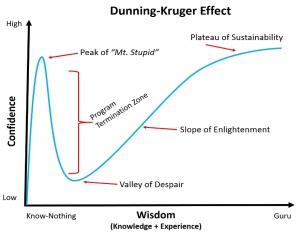The Dunning-Kruger effect is an interesting cognitive bias
where people who an incompetent are unaware of their own incompetence (top of mount stupid) and people who have high ability may underestimate their own competence. Charles Darwin summarised it well when he said "Ignorance more frequently begets confidence than does knowledge".
The effect seems to be on the rise and this seems to be due
to people being ‘more actively misinformed’. Information is everywhere, and
anyone can write a blog or post about anything (*cough*my own blog*cough*),
encouraging the spread of misinformation. There is really no filter on the
internet. Although, it can be actually quite comforting to think that everyone
is just winging it (writes Oliver Burkman), this is a dangerous place to
be, especially in medicine! Fortunately many medics will find themselves at the
opposite end of the spectrum, in a position where they are overwhelmed by the
shear amount of knowledge and expertise they will need in the future. One way
to approach this is the fake-it-to-become-it approach as popularized in thisTED talk by Amy Cuddy. It works by throwing yourself in the deep end and
working step by step towards the end goal acting as if you were already there
(not without staying humble and keeping that fear of inadequacy of course).
I guess to close this post what I want to point out is that
you can now understand how some politicians seem so certain about everything
while infact knowing nothing (because they in fact know nothing). And one
should assess their own position on the Dunning-Kruger curve from time to time,
by taking a step back, assessing one’s own knowledge objectively and paying
attention to critism carefully.
PS: in reply to the eight year old, I found this interestingbreakdown of how world war three might actually happen by Tobias Stone:
Brexit in the UK causes Italy or France to have a similar referendum. Le Pen wins an election in France. Europe now has a fractured EU. The EU, for all its many awful faults, has prevented a war in Europe for longer than ever before. The EU is also a major force in suppressing Putin’s military ambitions. European sanctions on Russia really hit the economy, and helped temper Russia’s attacks on Ukraine (there is a reason bad guys always want a weaker European Union). Trump wins in the US. Trump becomes isolationist, which weakens NATO. He has already said he would not automatically honourNATO commitments in the face of a Russian attack on the Baltics.With a fractured EU, and weakened NATO, Putin, facing an ongoing economic and social crisis in Russia, needs another foreign distraction around which to rally his people. He funds far right anti-EU activists in Latvia, who then create a reason for an uprising of the Russian Latvians in the East of the country (the EU border with Russia). Russia sends ‘peace keeping forces’ and ‘aid lorries’ into Latvia, as it did in Georgia, and in Ukraine. He annexes Eastern Latvia as he did Eastern Ukraine (Crimea has the same population as Latvia, by the way).A divided Europe, with the leaders of France, Hungary, Poland, Slovakia, and others now pro-Russia, anti-EU, and funded by Putin, overrule calls for sanctions or a military response. NATO is slow to respond: Trump does not want America to be involved, and a large part of Europe is indifferent or blocking any action. Russia, seeing no real resistance to their actions, move further into Latvia, and then into Eastern Estonia and Lithuania. The Baltic States declare war on Russia and start to retaliate, as they have now been invaded so have no choice. Half of Europe sides with them, a few countries remain neutral, and a few side with Russia. Where does Turkey stand on this? How does ISIS respond to a new war in Europe? Who uses a nuclear weapon first?


No comments:
Post a Comment